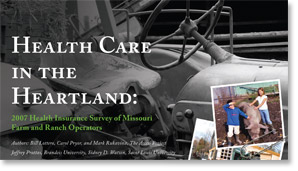|
 Health care costs are hitting Missouri’s farmers and ranchers hard. A new study released Thursday, September 25th, 2008, demonstrates the burden that healthcare expenses are placing on Missouri’s farm and ranch families. (Click here for a PDF of the report) Health care costs are hitting Missouri’s farmers and ranchers hard. A new study released Thursday, September 25th, 2008, demonstrates the burden that healthcare expenses are placing on Missouri’s farm and ranch families. (Click here for a PDF of the report)
The new study released by the Missouri Rural Crisis Center (MRCC), Health Care in the Heartland: 2007 Health Insurance Survey of Missouri Farm and Ranch Operators, is the result of research and analysis conducted in conjunction with Missouri Jobs with Justice, St. Louis University Center for Health Law Studies and The Access Project. USDA was contracted to survey farmers in seven Great Plains states. Data from the 2007 Great Plains Survey of Farm and Ranch Operators was the basis for the Missouri report.
“I don’t think people realize the extent to which the current healthcare system is negatively impacting family farmers and rural communities,” says Rhonda Perry, family farmer from Howard County and Program Director of the Missouri Rural Crisis Center. “It is imperative for us to add the voices of farm families to the healthcare debate. Investing in affordable and accessible healthcare is not only critical for the well-being of farm families, but it is also a sound economic investment for rural communities,” explains Perry.
Key findings of the report include:
- One out of five Missouri farmers and ranchers surveyed reported that healthcare costs contributed to their financial problems, including, making it difficult to pay off farm or ranch loans, increasing the need to seek secondary employment away from the farm and causing them to delay farm investments.
- People with high premium policies spent significantly more overall on health care than those who had low premium policies.
- Farm families insured through the individual market spent over two thousand dollars more than those insured through off-farm or ranch employment
- Farmers and ranchers who bought insurance in the individual market overwhelmingly reported relying on the costliest types of policies -- those with high premiums and high deductibles.
Richard Williams, a Red Angus cattle farmer from Tipton, Missouri explains, “We spend 15% of our income on health insurance, and that is money that we could be investing on our farm. We have a catastrophic policy with a $5,000 deductible just to protect ourselves and our farm in the case of a health crisis, and I know a lot of farmers are in the same boat.”
As the state with the second highest number of farms, Missouri farmers play a critical role in our rural economy. Access to affordable health insurance is a key factor in farm families’ decision to pursue off-farm income. Missouri farmers depend more on off-farm employment as a source of employer sponsored health insurance than other Midwestern states. This report clearly shows that the private, individual market is not working for Missouri farmers because it forces farm families to obtain the most expensive policies that result in the highest overall healthcare costs.
“This report shows how critical good healthcare policies could be for rural communities and family farmers,” says Sidney Watson, Professor at the St. Louis University Center for Health Law Studies. “It is important to understand that there are policy solutions that can effectively make healthcare more affordable and accessible. Missouri could do much more to protect rural families and control costs.”
Effective solutions will likely require a combination of policies to improve access and affordability for farm families. Possible solutions include:
- Increasing opportunities for farmers and other small businesses to benefit from health insurance pools, such as, creating purchasing pools for small businesses or allowing them to buy into existing insurance pools.
- Requiring insurance companies to spend a certain percentage of the premiums they take in on medical care for their insured.
- Demanding that insurance companies doing business in Missouri offer low deductible policies with affordable premiums.
- Increasing access to effective public insurance programs
|



